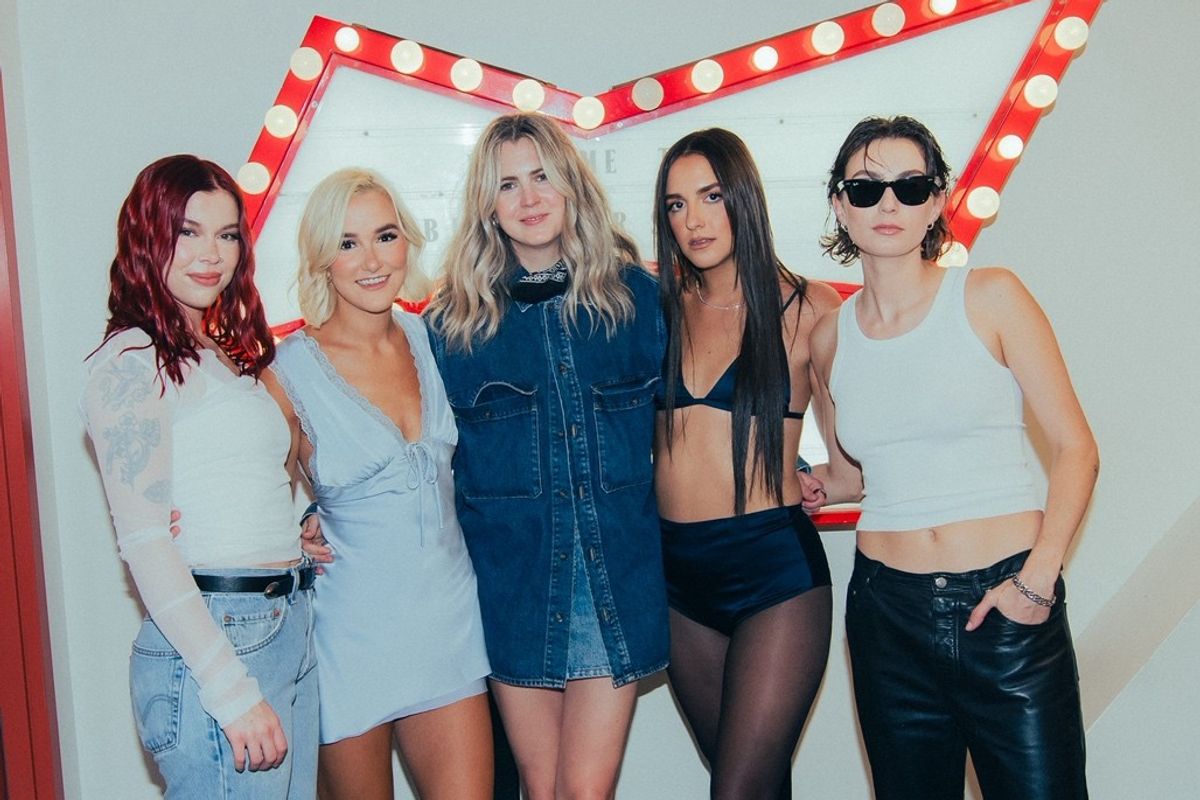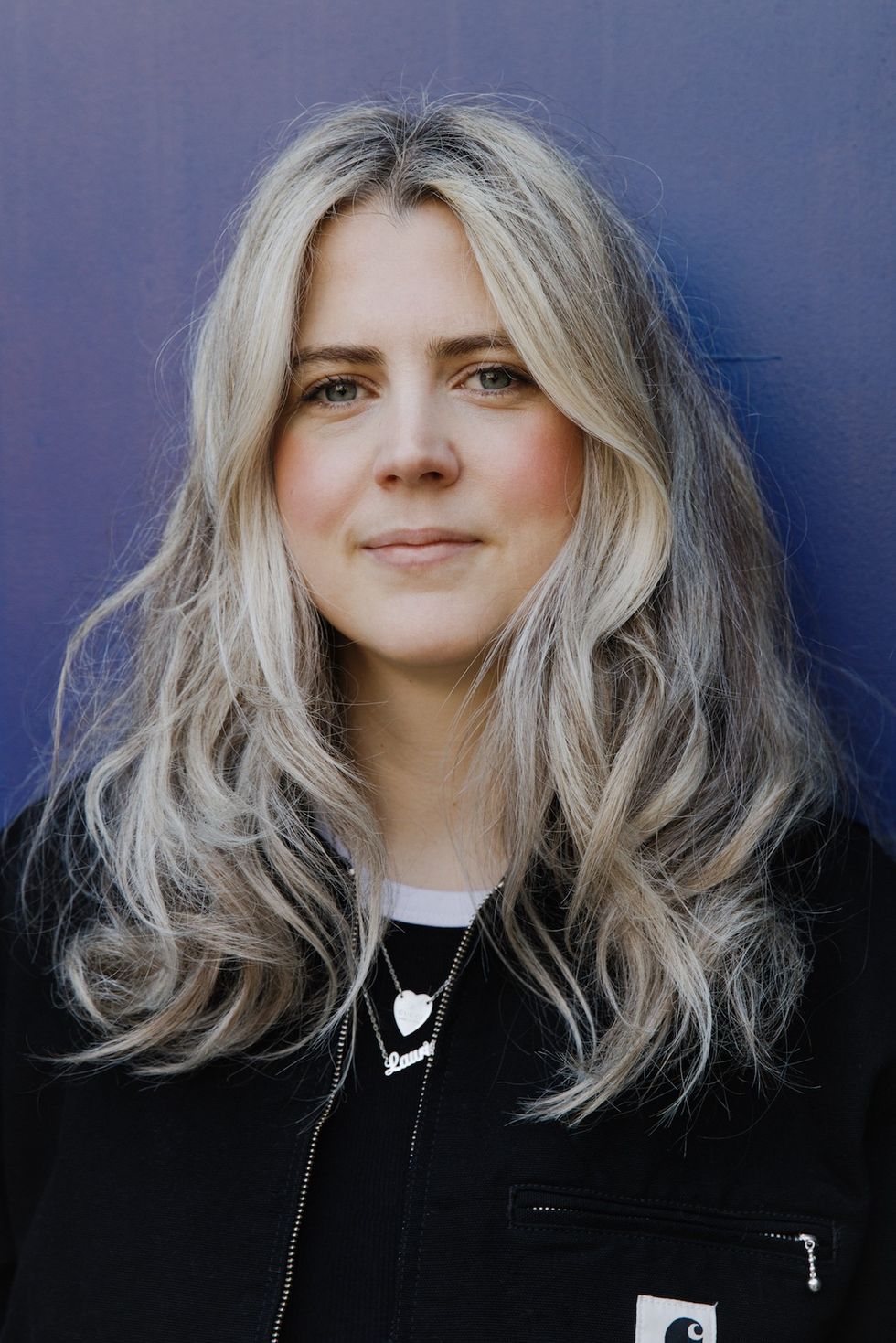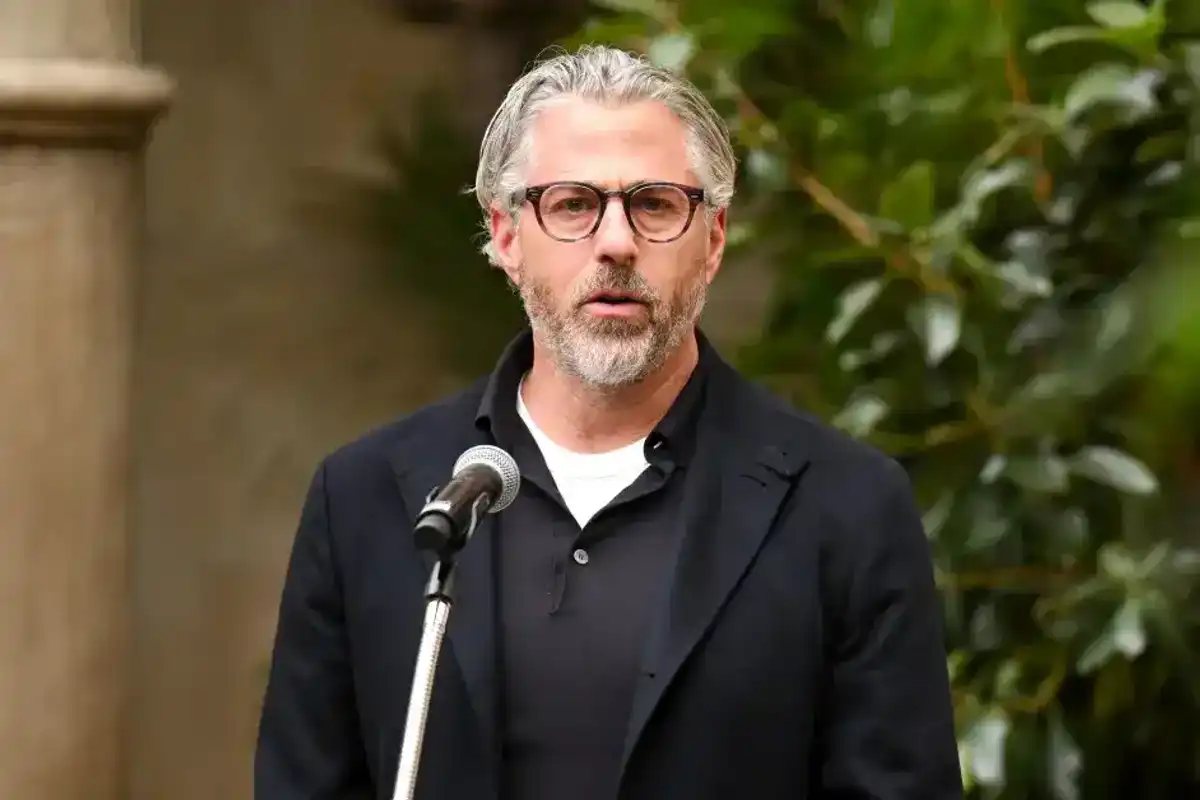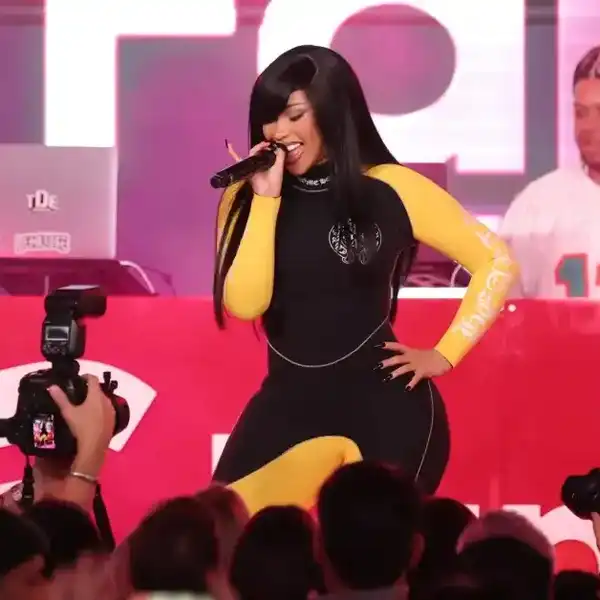How Laurie Lee Boutet Helped The Beaches Turn Their Viral Moment into A Long-Term Breakthrough
Boutet, founder of Wednesday Management, is this year's Billboard Canada Manager of the Year.

Laurie Lee Boutet (middle) with The Beaches
In the high-stakes world of music management, Laurie Lee Boutet has become a voice for what it means to build something meaningful, sustainable and fiercely independent.
At the helm of Wednesday Management, Boutet has helped shape the trajectory of Toronto rock outfit The Beaches, who, after a viral breakout with 2023’s “Blame Brett,” are now selling out shows across North America and headlining major festivals. After playing Coachella this summer, they’re about to host a Last Girls at the Parties DJ night for their fans followed by an intimate show at the Mod Club for NXNE before their biggest ever hometown headlining show at Scotiabank Arena on November 6.
Recognizing her role in their success, Boutet has been named Manager of the Year by Billboard Canada, which she will accept at this week’s Managers to Watch and Honour Roll event in partnership with Music Managers Forum (where Boutet is a board member) on June 11 at NXNE.
There’s a saying in music that artists don’t go viral on TikTok, songs do. Boutet helped prove that wisdom wrong. What began as a single taking off on TikTok quickly turned into a full-speed-ahead campaign that tested the band’s limits – and Boutet’s strategic vision. “When a big one hits, you have to go full throttle to capitalize on it,” she explains. “A few weeks after it went viral, we sat down and said, ‘Okay, the next 18 months are probably going to be some of the busiest of your lives. Is everyone ready?’ And the girls were like, ‘Hell yeah.’”
In an interview with Billboard Canada, Boutet talks us through that pivotal moment, the surprising math behind The Beaches’ rapid rise – from 4,000 tickets to 16,000 in a year – and how she helped steer the band through being dropped by a major label into the biggest success of their career as an independent act. She also reflects on her own journey – from her early days in A&R in the U.K. and Canada, to co-managing Charlotte Cardin, to a career-changing meeting with The Beaches that led to a new chapter for everyone involved.
“From day one, I just knew what they were missing,” she recalls. She could see the path forward, and it’s been paying off in a bigger way than anyone could have expected.
Congrats on winning Manager of the Year! You’ve been on a journey the last couple of years with The Beaches. First, there was the breakthrough of “Blame Brett” in 2023, and now they’ve just played Coachella, they won a Juno Award for Group of the Year, they have an upcoming album No Hard Feelings, out on AWAL on August 29, and they’re playing an intimate hometown show at Mod Club as part of NXNE followed by their biggest headlining show ever at the Scotiabank Arena on November 6. What have the last two years been like for you?
It’s a little bit overwhelming. There’s a big responsibility that comes with following up the success of an album. Inevitably, there’s a lot of pressure around it. But at the same time, we’ve spent so much time preparing for this moment – organizing, thinking, planning – that when it actually comes, most of the heavy lifting has already been done. So in a way, it’s actually a relief.
The Juno win was incredible. I don’t think we expected it. The band and I really thought Sum 41 was going to win. It was their retirement year. And it’s funny, because even though you tell yourself, "It's not our year," my body was still shaking when the nominations were being announced. So to have that win was completely unexpected – but in my opinion, very well deserved, especially for the band. 2024 was by far the best year of their career. It honestly feels like a bit of a fever dream. You’re just constantly moving forward.
“Blame Brett” came out in 2023, so why in particular was 2024 the best year of The Beaches’ career?
So the single “Blame Brett” came out in May 2023, right at the beginning of the month, and it actually only went viral toward the end of the month. When you have a viral moment, it can really change everything.
That’s when the real work started. They had already written the album and finished all the content, but when things really started picking up, that’s when the grind kicked in. It’s one thing for a song to go viral, but I was checking Spotify every day, and it just kept growing – even without a million other viral moments pushing it. I realized the song wasn’t just viral, it was really connecting with people.
When that happens, you have two choices: you either celebrate the success and leave it at that, or you double down and work incredibly hard to build on the momentum. They’d been waiting for this moment forever. They were totally ready to work.
@thebeachesband BLAME BRETT AT GOV BALL!!! #govball #festival #ontour #band #songofthesummer
For many artists, a viral hit can outshine their long-term growth. How did you and The Beaches turn that moment into something more lasting, leading to bigger opportunities?
“Blame Brett” was definitely a success for us, but it wasn’t a mega mega hit. The tickets actually outweighed the streams. When you look at the numbers, it’s wild. How did this band go from selling 4,000 tickets to 16,000 tickets in just 18 months?
The Beaches aren’t a brand new band. They’ve been doing this for well over a decade, since they were teenagers. They were signed to the major label Universal and dropped in 2022, then had their biggest success as an independent act. When did you first start working with them?
They were in the process of getting dropped when I met them for the first time. It was right at the beginning, and they were devastated. They loved Universal. I genuinely believe Universal loved The Beaches as well, but at the time, they’d spent a ton of money, and the records just weren’t connecting the way they wanted them to.
I wasn’t even the first to pitch for their business. I didn’t think I’d get it. It took me like two months to actually pick up the phone and send them a text. They were pretty far along in the process when I finally sat down with them. “Your music is just too rock, and rock music doesn’t stream. It doesn’t make sense because you’re made for a streaming service. You’re cool, young girls, funny as hell. If you made the records 20% more pop, I think people would open their arms to you, and you’d get more streams and playlist placements.”
I could tell with Kylie [Miller] and Leandra [Earl] at that first meeting, when I was telling them this, they were like, “Holy shit.” I was as shocked as they were, to be honest. Then, right after, they said they'd love for me to meet with Jordan [Miller] and Eliza [Enman-McDaniel].
How did you get to that moment? How did you find yourself at the point where you were ready to make that pitch to The Beaches?
I lived in the U.K. when I was 18 and didn’t really know I wanted to work in music. I started a music blog, and through that, I met an A&R person who explained to me what A&R was. I thought, “Oh, that sounds exciting.” So I ended up getting a job at Mercury Records, which eventually became Virgin EMI. I worked as an A&R scout there for two years. Then I moved back to Canada and I worked in A&R for Universal Canada for about 18 months.
What are the key differences between working in Canada and the U.K.?
In the U.K., there were like 50 A&R scouts, and you were out every night at shows. You were rarely in the office, mostly in studios. In Canada, it was very different. I went from having a glass office to a cubicle and working a nine-to-five schedule. Coming from such a competitive market, I easily got a little bored because you could find everything in one day. So I started developing artists on the side, seeing if I could get them to a point where they might sign to a major. That’s when I decided to leave and start a management company, over nine years ago.
My first client was Ralph, who is still making music. When I was at Universal, Jason [Brando, head of Cult Nation] and Charlotte Cardin asked me if I could quit my job and manage her. So I started managing Charlotte Cardin really early in her career alongside Cult Nation.
Then in 2019, Charlotte, Cult Nation, and I parted ways, and she was my biggest client at the time. That was a really difficult moment for me. Thankfully, I started consulting at Arts & Crafts in A&R. The timing was wild because the pandemic started the day I began consulting there. So I give them all the credit for saving my mental health. Having something to do every day and being able to work with them was a blessing in disguise and an amazing opportunity.
When I met with The Beaches, I was consulting half-time at Arts & Crafts and managing my existing clients the other half, kind of one foot in, one foot out.
Did you already know The Beaches when you were both at Universal?
I remember when I left Universal, Jeffrey [Remedios, head of Universal Music Canada at the time] kind of sat me down and said, “We’d love for you to stay. We just signed this group of four women. I think you’d be a really great A&R person for them.” It was kind of funny that I left right as they were joining the company. I’d actually met them a few times before, and we really loved each other from early on. From day one, we just hit it off like a house on fire. They would have been around 18 years old then.
They’re an independent band, you’re an independent manager. Do you think there are benefits to working this way versus being in that major label machine?
I’m a person who thinks there’s no one-size-fits-all. It really depends on the circumstances. There are moments when I think a major label is amazing, and there are moments when I think being independent is amazing. Sometimes when you’re at a major, there are people sitting in the boardroom – especially when you’re super young – like 20 people deciding what kind of music you should be making, how you should look and how you should be.
I’m not sure that’s the best thing to be doing. When you’re developing, the most important thing is to have the least amount of cooks in the kitchen. Authenticity is so important in connecting with fans, so being able to do everything independently and hire people who truly represent the band is crucial. We have a crew mostly made up of young women or women allies, and I think hiring those people helps tell the story of The Beaches from a much more authentic lens than just hiring anyone or too many people.
When it comes to majors, there’s a lot more red tape. When “Brett” went viral, we spoke to a lot of U.S. majors, but they all would have pushed the album release back, tried to focus on one single, and slowed everything down. I actually think the success of the album and touring came because the album came quickly after the viral moment, which helped capitalize on that moment and get the rest of the album discovered.
So sometimes it’s really good to be independent, especially when you want to move fast, when you’re developing, rebranding, or trying to make something super authentic. If you already have commercial success and want to plug into international systems with big budgets, that’s where a major makes sense.
How would you explain your role as an artist manager? What is your day-to-day like?
It’s essentially like I’m the bodyguard between the artist and the rest of the world. The artist’s job is to be creative, to perform, to do promo, to really focus on the creative side of the business. The strategy, the admin, the foresight and all the boring business stuff fall to the manager.
Why is it important to highlight the role of managers in an artists’ career? What do you think people should know about the role?
Even within the industry, I have people who just assume that I'm booking flights for my clients. You know, there's a really big difference between a personal assistant and an artist manager, and I think a lot of people tend to get both confused. Not that we don’t do some personal assisting at the beginning when they’re brand new, but it’s a very particular role.
It’s really changed over the last, like, 10 years, because artists are more independent and because a lot of the marketing comes from the artist and the management. And so the role is just continuously changing and evolving. Whereas I think 10–20 years ago, a manager would just be managing deals.
What are the unique challenges or benefits to being a manager in Canada vs. in the rest of the world?
I actually think there's a huge benefit to being a Canadian manager and being a Canadian act. I think people think that it's really difficult to get out of Canada – which, I mean, don't get me wrong, is definitely not easy – but I think that we have such amazing DSP [digital service provider] partners like Spotify, Apple and Amazon, and there are local teams that are dying to help pitch your music internationally. If you have a record that can compete in Canada, they're going to be the ones singing your praises to the international team.
If you're an American artist, you're kind of competing with three billion developing artists. If you're Canadian, you're competing with a smaller pool of people, but you also have a Canadian team that's going to cheerlead you to get playlisting in America and to export. It's actually a faster way to get that American playlisting, that American exposure, using the Canadian teams domestically.

Beyond The Beaches, a lot of your roster seems to be artists on the verge of a big break. Alex Porat’s “Face Like Yours,” for instance, is currently on the Billboard Canadian Airplay charts, Venbee has charted in the U.K. and Connor Seidel has had success as a producer and songwriter with acts like Charlotte Cardin and Half Moon Run. What do you look for when choosing who to work with at Wednesday?
I wish I could tell you what it is. There’s no piece of paper that says what we’re looking for. A lot of it is based on feeling. A lot of it is the ability to see the path forward. For me as a manager, my strength lies in strategy. I love the strategy of releasing a record. I call them hacks. Obviously, TikTok’s a hack, but how do we find the best way to do digital marketing and get into different markets? Anything that’s super nerdy, that’s data-driven, I’m kind of obsessed with.
So when my brain is constantly focused on strategy, it has to be something that I can see the path forward with. It was like that with Alex [Porat]. At the time, she had maybe 350,000 YouTube subscribers, and I could see that if we leveraged YouTube, we could grow and use it as a way to build up her original music. It’s always about, what’s the next step? That only comes when you understand the project, you see the artist, and you understand what they’re doing.
With The Beaches, what’s the path forward? Do you know how far they could go from here?
I always say The Beaches is for everyone. It's for queer women. It's for straight women. It's for dads and daughters. It's for boyfriends and girlfriends. I definitely think the sky is the limit.
- The Beaches Hit the Top 40 on the Billboard Canadian Albums Chart With ‘No Hard Feelings’ | Billboard Canada ›
- The Beaches atteint le top 40 du classement des albums canadiens de Billboard avec « No Hard Feelings » | Billboard Canada ›
- Valley Signs With Wednesday Management: ‘We Are Looking Forward to the Next Mountain We Climb Together!’ | Billboard Canada ›
- Valley s’associe à la direction de Wednesday : « Nous avons hâte de gravir ensemble notre prochaine montagne ! » | Billboard Canada ›
- The Beaches Play Their First Hometown Arena Concert in Toronto: Canadian Concerts of the Week | Billboard Canada ›

















